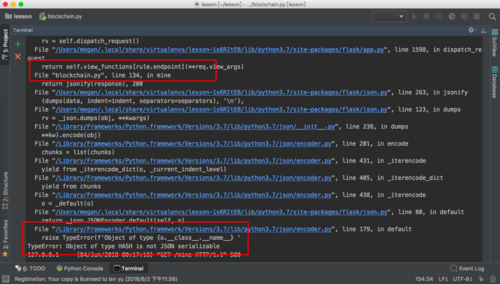json 序列化不了

# 一个区块的基本结构
# {
# "index": 0,
# "timestamp": "",
# "transactions" : [
# {
# "sender": "",
# "recipient": "",
# "amount": 5
# }
# ],
# "proof": "",
# "previous_hash": ""
# }
import hashlib
import json
from time import time
from uuid import uuid4
from flask import Flask, request
from flask.json import jsonify
class Blockchain:
def __init__(self):
# 定义一个区块链
self.chain = []
# 定义一个交易信息
self.current_transactions = []
# 定义一个创世区块
self.new_block(proof=100, previous_hash=1)
# 新建一个区块
def new_block(self, proof, previous_hash=None):
block = {
'index': len(self.chain) + 1,
'timestamp': time(),
'transactions': self.current_transactions,
'proof': proof,
'previous_hash': previous_hash or self.hash(self.last_block)
}
self.current_transactions = []
self.chain.append(block)
return block
# 新建交易记录(交易的发送者,交易的接收者,交易的金额)
def new_transaction(self, sender, recipient, amount) -> int:
self.current_transactions.append(
{
'sender': sender,
'recipient': recipient,
'amount': amount
}
)
return self.last_block['index'] + 1
# 计算区块的哈希值
@staticmethod
def hash(block):
block_string = json.dumps(block, sort_keys=True).encode()
return hashlib.sha256(block_string)
# 获取区块链里面最后一个块
@property
def last_block(self):
return self.chain[-1]
# 工作量证明
def proof_of_work(self, last_proof: int) -> int:
proof = 0
while self.valid_proof(last_proof, proof) is False:
proof += 1
print(proof)
return proof
# 挖矿动作
@staticmethod
def valid_proof(last_proof: int, proof: int) -> bool:
guess = f'{last_proof}{proof}'.encode()
guess_hash = hashlib.sha256(guess).hexdigest()
print(guess_hash)
return guess_hash[0:4] == "0000"
# 节点之间的通讯
app = Flask(__name__)
blockchain = Blockchain()
# 生成一个uuid给自己做交易名称
node_identifier = str(uuid4()).replace('-', '')
# 测试通讯
@app.route('/index', methods=['GET'])
def index():
return 'Hello BlockChain'
# 接收交易信息请求
@app.route('/transactions/new', methods=['POST'])
def new_transactions():
values = request.get_json()
required = ['sender', 'recipient', 'amount']
if values is None:
return 'Missing values', 400
if not all(k in values for k in required):
return 'Missing values', 400
index = blockchain.new_transaction(values['sender'], values['recipient'], values['amount'])
response = {
'message': f'Transaction will be added to block {index}'
}
return jsonify(response), 201
# 打包交易 -> 挖矿
@app.route('/mine', methods=['GET'])
def mine():
last_block = blockchain.last_block
last_proof = last_block['proof']
# 挖矿,并添加工作量证明
proof = blockchain.proof_of_work(last_proof)
# 给自己一个交易信息
blockchain.new_transaction(sender='0', recipient=node_identifier, amount=1)
block = blockchain.new_block(proof, None)
response = {
'message': 'New Block Forged',
'block': block['index'],
'transactions': block['transactions'],
'proof': block['proof'],
'previous_hash': block['previous_hash']
}
return jsonify(response), 200
# 返回整个区块链信息
@app.route('/chain', methods=['GET'])
def full_chain():
response = {
'chain': blockchain.chain,
'length': len(blockchain.chain)
}
return jsonify(response), 200
if __name__ == '__main__':
app.run(host='0.0.0.0', port=5000)693
收起











